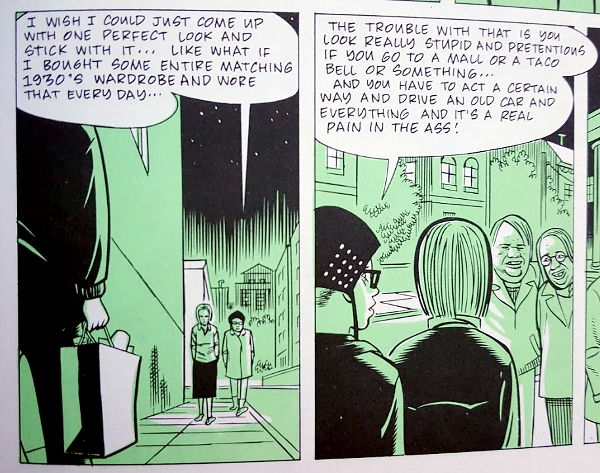Look Who’s Back
by Timur Vermes is a German satirical novel about Hitler. (As my German extends as far as noting that the apple is green and the girl’s dress is blue, I read it in translation as “Look Who’s Back” by Jamie Bulloch.)
The story begins with Hitler waking up, dazed and stinking of petrol, on an anonymous patch of parkland – in 2011. He has no memory of what came immediately before (his last memory is seemingly sitting with his wife Eva in the Fuhrerbunker) and no idea where he is or how he got there. In part, it is a standard fish out of water narrative – we laugh at his inaccurate impressions of fashion and technology while being reminded just how ridiculous and fleeting trends are.
But of course, he’s not just any old time traveller – he’s Hitler. His views are not just that of a man out of his time period or even a generic Nazi out of his time period, but … Hitler. Everything is seen from – and often misunderstood because of – his singular view point, which allows for some fun wordplay early on (think the Back to the Future ‘give me a Tab/I can’t give you a tab until you order something’ conversation but about advertising flyers & the Luftwaffe) and more involved political satire later on.
More interestingly, we see how others react to him. While he is clearly recognisable (especially when wearing his military uniform), no one really, truly accepts that he is who he says he is. He’s mistaken as a method actor or a committed comedian doing a bit to satirise the state of Germany in the 2010s, and a stroke of good fortune puts him on the path to becoming a television/YouTube star. He doesn’t try to be funny of course but people laugh anyway: partly at the non-sequiturs, partly out of discomfort and/or surprise that anyone has said such an outrageous thing and partly at the juxtaposition between his views & the reality of life today. The latter is key to his popularity – people assume he’s satirizing contemporary politics while actually he’s trying to regain his former position. In the end (spoilers), he enrages the wrong people (not who you’d think) and ends up in hospital – where he finds himself courted by the full rainbow of political parties in Germany because they each feel there is some overlap between his ideas and their own.
It’s an interesting premise which creates plenty of comedy, but ultimately I was a little disappointed with it. I suspect this is, in a large part, because I’m not intimately familiar with the current political situation in Germany (which is much more complicated than ours in the UK) so missed a lot of the nuance. But the book also let itself down on occasion too: for example, it tiptoes towards some difficult subjects (such as his secretary having Jewish ancestry and her grandmother losing her entire family in the Holocaust) but then at the last minute either backs away again or drops them all together. Hitler is also unnecessarily dumbed down on a few occasions simply to make “world be crazy now” jokes, when there are enough legitimate ones of those already: especially later on in the book, these undermine the developing character and narrative.
Having Hitler as the narrator also makes the book a little hard going. It’s very much Hitler rants, even when he’s
not
orating
on his
television
show
– which gets a little tiresome. I realise criticising Hitler for being a “little too ranty” is an odd complaint but the use of heightened language for long stretches rather interfered with my enjoyment of reading: it was like being bludgeoned with words rather than happily absorbing them. Even with all the ranting though, I felt like the handling of the character was a little too sympathetic – or rather didn’t quite go far enough into the vileness of his beliefs and actions. I don’t think there is any value in simply portraying Hitler as an all-out evil monster (in fact I think that’s incredibly harmful) but I think the ultimate point of the book would be stronger if he was more accurately awful: that he could rise/return to power in spite of his worst ideas because ordinary people can see value in some parts of what he is saying and ignore the rest until it is too late.






